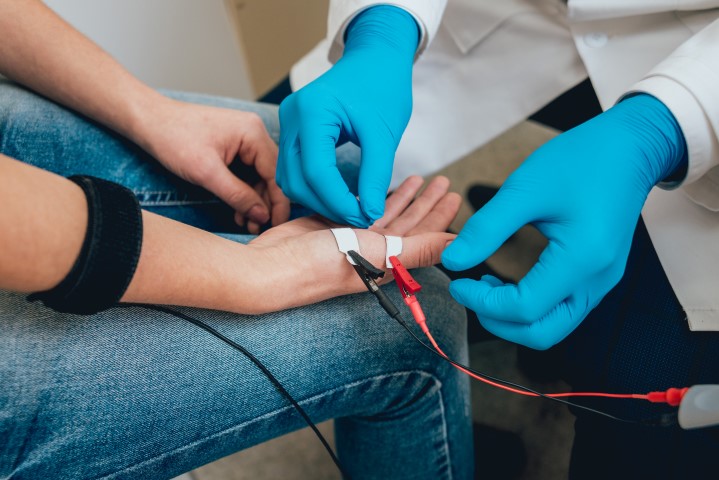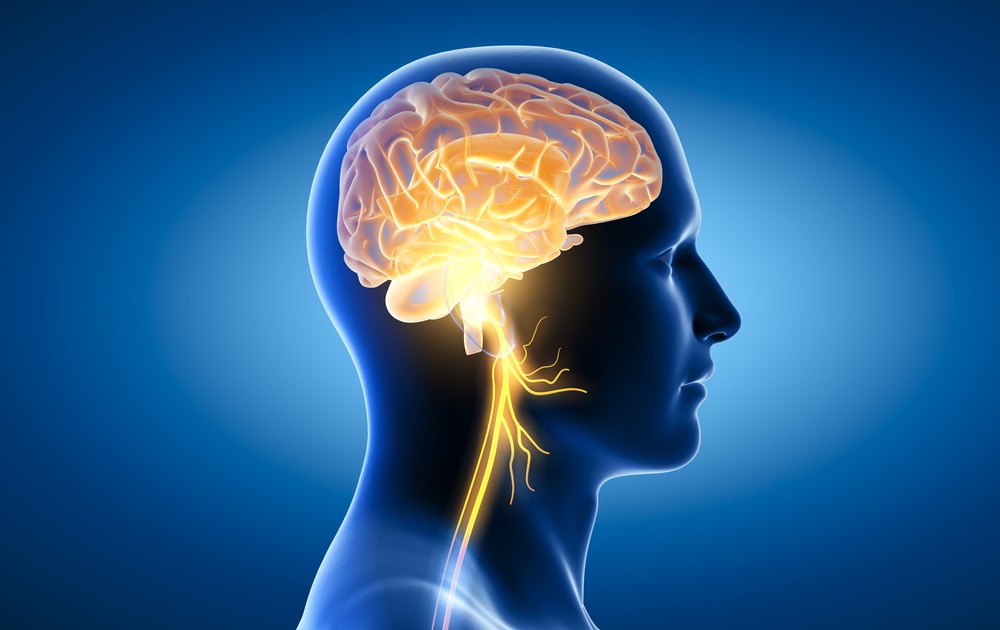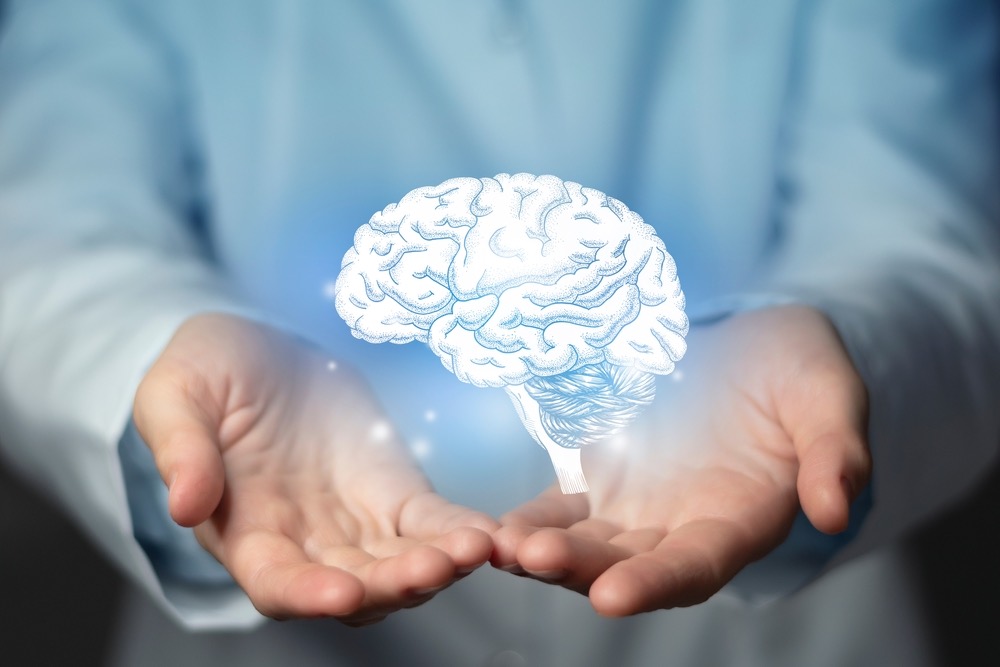EMG/NCS refers to the combined procedures of electromyogram and nerve conduction studies. During an EMG, Dr. Hashwani will pinpoint the source of your pain and symptoms by conducting an electrical test of your nerves and muscles. A small, thin needle is inserted into your muscles during the EMG.
Thereafter, Dr. Hashwani will conduct a NCS to examine how your body’s electrical signals are traveling to a nerve. This is done by applying small electrical stimuli to the nerve and recording how the nerve works. This may cause a quick, mild, tingling feeling.

What is EMG/NCS? Why does someone get an EMG/NCS?
EMG/NCS stands for Electromyogram (EMG) and Nerve Conduction Studies (NCS), two crucial tests that provide a window into the health and functionality of muscles and nerves. The human body, like a complex electrical circuit, relies on nerves to transmit signals. An EMG evaluates the electrical activity within muscles, both at rest and during contraction. NCS, on the other hand, measures how well and how fast the nerves can transmit electrical signals. Physicians recommend these tests when patients report symptoms like muscle weakness, numbness, tingling, or spasms, which might indicate conditions ranging from nerve root injuries, neuromuscular diseases, to peripheral nerve disorders.
What you should expect during an EMG/NCS
The thought of undergoing an EMG/NCS can be daunting, but being informed can ease anxiety. During an EMG, after cleaning the skin, a thin, fine needle is inserted into the muscle to measure its electrical activity. This might cause a brief, mild discomfort but is generally well-tolerated. For the NCS, electrodes are adhered to the skin. Small electrical pulses are then sent through the nerves, which might feel like a quick, tingling sensation. Both tests together usually last between 30 minutes to an hour.

About the Procedure (EMG)
The Electromyogram (EMG) procedure delves into the intricate world of muscle function. Our muscles produce electrical currents when they contract. An EMG uses fine needles to detect and measure this activity, translating these currents into patterns that can be visualized on a screen or heard through speakers. These patterns give Dr. Hashwani invaluable information about the health and function of the muscles and the nerves activating them.
Before the Procedure (EMG)
To ensure the best results from your EMG, there are some preparations to keep in mind. It’s essential to avoid applying lotions or creams on the day of the test, as they can interfere with the electrode function. Clothing should be comfortable and easy to roll up. Before the procedure, it’s crucial to discuss with Dr. Hashwani any medications you’re on, especially blood thinners.
After the Procedure (EMG)
Post-procedure, it’s normal to experience a bit of tenderness or mild bruising at the needle insertion sites. Applying a cold pack can help alleviate this. While there aren’t strict limitations post-EMG, you might consider taking it easy for a day, especially if you feel any muscle soreness.
About the Procedure (NCS)
Nerve Conduction Studies (NCS) are pivotal in assessing the health of our peripheral nerves. By stimulating the nerve with small electrical charges, Dr. Hashwani can measure the speed and strength of the signal transmission. This data helps pinpoint areas of nerve damage, slowed conduction, or both, aiding in the accurate diagnosis of various conditions.
Before the Procedure (NCS)
To ensure accurate NCS results, it’s essential not to apply any lotions or creams on your skin. Being calm and relaxed is crucial, so feel free to ask any questions before starting. Your body temperature can influence the results; hence, it’s advised to be warm.
After the Procedure (NCS)
After undergoing an NCS, patients can typically resume their daily activities without any restrictions. Some may experience minor redness or tingling at the electrode sites, but these symptoms are transient and should dissipate quickly.


Hashwani Neurology And Neurophysiology Clinic (HNNC)

Sugar Land, Texas – Hashwani Neurology and Neurophysiology Clinic (HNNC) has received Laboratory Accreditation with Exemplary status from the American Association of Neuromuscular & Electrodiagnostic Medicine (AANEM). Arafat A. Hashwani, M.D., is the laboratory’s medical director.
“I am excited to receive AANEM Laboratory Accreditation exemplary status, explained Dr. Hashwani. We work tirelessly in our lab to provide the best possible care and most accurate study results to our patients every day. We will continue our pursuit of perfection and never cease to improve ourselves, our knowledge, and the services we provide our patients.”
The AANEM established laboratory accreditation criteria for electrodiagnostic (EDX) laboratories to ensure patients receive quality medical care in a safe environment. Laboratory accreditation provides patients, referral sources, and payers with a credible measure to differentiate the laboratory’s quality of care. The accreditation standards evaluate the diagnostic services and clinical operations essential to providing quality patient care, which include:
- Clinical staff qualifications and continuing education
- Physical facilities
- DX equipment
- Protocols for performing EDX studies
- Patient reports
- Policies for ensuring the health and safety of every patient
Exemplary Status is the highest level of accreditation an EDX laboratory can achieve under the AANEM Accreditation Program. To be awarded Accreditation with Exemplary Status, physicians performing studies in the laboratory must:
- Have completed a neurology or physical medicine and rehabilitation residency program; and
- Have completed a minimum of three months of training in EDX medicine as part of a residency or fellowship program; and
- Be certified by the American Board of Electrodiagnostic Medicine (ABEM), or by the American Board of Psychiatry and Neurology (ABPN) in clinical neurophysiology, or by the ABPN/American Board of Physical Medicine and Rehabilitation in neuromuscular disease.
Providing EMG/NCS in Sugar Land
In Sugar Land, our dedication to excellence in neurology sets us apart. We offer unparalleled EMG in Sugar Land and NCS in Sugar Land services, equipped with the latest technology and backed by years of expertise. Our community trusts in our comprehensive Electromyogram in Sugar Land and Nerve Conduction Study in Sugar Land, all under the expert guidance of Dr. Hashwani. We strive for accuracy, precision, and compassionate care with every patient.
Contact Our Clinic Today
When it comes to neurological health, time and expertise matter. Reach out to our clinic today to schedule an EMG or NCS and partner with us in your healthcare journey. Our team is here to provide you with the highest standard of care in Sugar Land.
Schedule an Appointment/Evaluation
You can contact Dr. Hashwani for an evaluation by calling 281-313-0337 or by filling out the contact form below:
1. How long does an EMG/NCS procedure take?
Typically, each test takes about 20-30 minutes, but the combined procedures might last up to an hour.
2. Is the procedure painful?
While the procedure might cause some discomfort, most patients describe it as a tingling sensation rather than pain.
3. How soon will I get the results?
The preliminary results are often available immediately, with a comprehensive report shared within a few days.
4. Are there any side effects to the tests?
Side effects are rare, but there might be minor swelling or bruising at the site.
5. Do I need a referral for an EMG/NCS test?
Typically, a primary care physician or specialist will refer you. However, you can also contact our clinic directly for more information.
- Monday8:30 AM — 4:30 PM
- Tuesday8:30 AM — 4:30 PM
- Wednesday8:30 AM — 4:30 PM
- Thursday8:30 AM — 4:30 PM
- Friday8:30 AM — 1:00 PM
- SaturdayClosed
- SundayClosed
